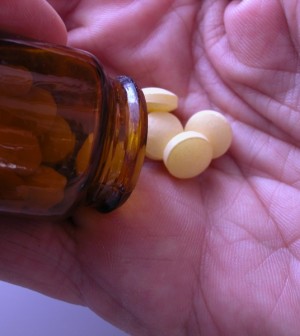- Could Your Grocery Store Meat Be Causing Recurring UTIs?
- Are You Making This Expensive Thermostat Error This Winter?
- Recognizing the Signs of Hypothyroidism
- 10 Strategies to Overcome Insomnia
- Could Artificial Sweeteners Be Aging the Brain Faster?
- Techniques for Soothing Your Nervous System
- Does the Water in Your House Smell Funny? Here’s Why
- Can a Daily Dose of Apple Cider Vinegar Actually Aid Weight Loss?
- 6 Health Beverages That Can Actually Spike Your Blood Sugar
- Treatment Options for Social Anxiety Disorder
Try Home Remedies for Child’s Cough or Cold

Instead of turning to over-the-counter cough and cold remedies, parents should consider treating their children with home remedies, says a leading group of U.S. pediatricians.
Like all medications, even cold and could remedies available without a prescription can cause serious side effects in young children, the American Academy of Pediatrics cautions.
Because of the risks, the U.S. Food and Drug Administration in 2008 recommended that children younger than 4 years old never be treated with over-the-counter cough and cold medicines.
Children between 4 and 6 years old should only take these remedies under the direction of their doctor, the academy said in a news release. But children older than 6 can safely take over-the-counter drugs if the dosage instructions on the package are followed correctly.
There are safer, more convenient and less costly ways to provide sick kids with some relief from such symptoms as a stuffy nose and coughing, the academy advised. Some of its suggestions include:
- Runny nose: Grab a tissue. A runny nose can be stopped by suctioning it or blowing it. Although antihistamines are useful in treating nasal allergies, they don’t help relieve cold symptoms. The good news is that runny noses help the body get rid of the nasty viruses that make kids sick.
- Stuffy nose: No medication can remove dried mucus or pus from the nose, but nasal washes can help. Saline nose spray or drops may loosen up mucus so that kids can blow their nose more easily. Saline solution can be made at home by adding 2 milliliters (mL) (0.4 teaspoon) of table salt to 240 mL (8 ounces) of warm tap water. If saline isn’t available, a few drops of warm water in each nostril also works. This can be repeated until the nose becomes clear. Very sticky mucus can also be removed with a wet cotton swab. If the air is dry, using a humidifier or running a warm shower can keep kids’ mucus from drying up.
- Coughing: Children under 3 months old should be seen by their doctor. Babies between 3 months and 1 year with a cough can be given one to three teaspoons (5 to 15 mL) of warm, clear fluids, such as water or apple juice, four times daily. Children younger than 1 year should not consume honey, but kids older than 12 months can take up to one teaspoon of honey as needed to thin their mucus and loosen their cough. If honey isn’t available, corn syrup could also help. However, research shows that honey reduces the frequency and severity of nighttime coughing better than corn syrup.
- Coughing spasm: Exposure to warm mist from a shower can help ease bouts of coughing.
Kids with coughs or colds may not always need treatment, the academy noted. If children aren’t bothered by their symptoms and continue to play and sleep normally, over-the-counter or home remedies aren’t necessary. These treatments are only helpful if illness is making children very uncomfortable and preventing them from sleeping.
Parents should also remember that fevers help the body fight viruses and should only be treated if they reach 102 degrees Fahrenheit or higher and the child is uncomfortable. High fevers and pain may be treated with acetaminophen (Tylenol) or ibuprofen (Advil, Motrin), the academy says.
More information
The U.S. Food and Drug Administration provides more tips on the safe use of cough and cold remedies.
Source: HealthDay
Copyright © 2026 HealthDay. All rights reserved.










